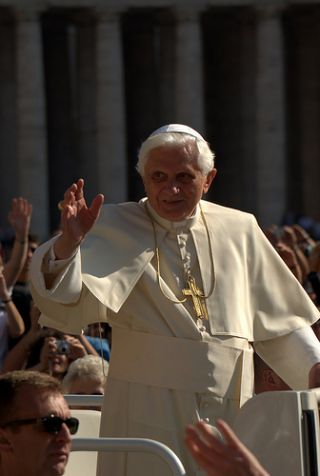
Psychoanalysis
Movie Review: We Have a Pope (2011)
Have you ever wondered what it might be like to psychoanalyze the Pope?
Posted May 25, 2012

image: Flickr/SergeyGabdurakhmanov
This blog curates the voices of the Division of Psychoanalysis (39) of the American Psychological Association. This post is a movie review by Margaret Kim Peterson, PhD. Have you ever wondered what it might be like to psychoanalyze the Pope (and who hasn't...)? Read on.
---
The pope has died, and the college of cardinals meets to elect a successor. Cardinal Melville has never been considered a front-runner, and no one is more taken aback than he when after many inconclusive ballots the vote settles on him. Reluctantly, he accepts. After all, what choice does he have? The papacy is not a job one rejects, and it’s not a job one resigns from, either. The last pope to do that was the saintly but naively apolitical Celestine V, who in 1296, after two years as pope, abdicated the papacy under pressure from his successor and then spent the rest of his life imprisoned in the Vatican. That’s not a precedent any later pope has cared to emulate.
Melville can’t refuse, and he can’t resign, so he does the next best thing: he panics. As the traditional announcement—“Habemus papam!” (“We have a pope!”)—is made from the balcony of St Peter’s Basilica to the faithful assembled in the square below, the camera cuts to Melville, in full papal regalia, seated, his hands over his face, screaming: “Aughhhh!” Now it is the cardinals and Vatican administrators who are faced with an unthinkable situation: a pope who doesn’t want to go on. What to do? This is an imaginative story, not a realistic one, and the cardinals do what only in imagination they might do: they decide to try…psychoanalysis.
The analyst is in a difficult position. The cardinals won’t tell him the patient’s name. (“Just call him Holiness.”) They won’t allow him to address any (stereo)typically psychoanalytic topics: sex, the patient’s childhood, his mother, any frustrated ambitions or failed dreams. They won’t even leave the room; the analyst is expected to consult with his patient in the presence of the entire college of cardinals. Faced with these constraints, the analyst makes a suggestion: perhaps the patient could be seen by someone else, someone outside the Vatican. The cardinals have come to him because he is the best, but (he assures them) he will send them to the second-best: his estranged wife, also an analyst.
The trip to the second analyst takes place, clandestinely—the remaining cardinals are led to believe that the pope-elect is in seclusion for purposes of prayer. And then, after the session, the pope eludes his handlers and vanishes onto the streets of Rome. Unrecognized, he mingles with people on the street, enters restaurants and stores, rides a public bus, stays in a hotel, watches the news, attends a theatrical performance, all the while agonizing about the role in which he has so unexpectedly been cast: the spiritual leader of a billion people. The original analyst, meanwhile, is required to remain at the Vatican. Deprived of his analytic role, he invents a new one: organizer of a round-robin volleyball tournament.
Viewers of a psychoanalytic bent will find much food for thought throughout the film. The main character’s name alone constitutes a kind of Lacanian flourish of intertextuality and wordplay: the pope-elect is named (Moretti has said in an interview) for French film director Jean-Pierre Melville, who himself adopted the name as a tribute to the American author Herman Melville, author of the short story, Bartleby the Scrivener, whose eponymous main character is best known for his oft-repeated statement, “I would prefer not to.” Indeed, Moretti’s Melville would prefer not to. But what would he prefer? And is he really free to choose? After all, the cardinals have chosen him. Through them, God has chosen him. Who is he to choose differently?
The film is filled with points of connection and contrast. The pope escapes (if only temporarily) the Vatican; the other cardinals and the original analyst are imprisoned there (again temporarily). While the pope attends rehearsals and then the performance of a play (Chekhov’s The Seagull), the cardinals are themselves playing (volleyball). The cardinals are in a hurry to get the pope over his hesitation to greet the faithful, and once the pope disappears his handlers are in a hurry to get him back. The pope, on the other hand, is in no hurry to get back, and the second analyst is in no hurry either—treatment in a case like his, she informs him, will require three meetings a week for a couple of years.
During the pope’s absence from the Vatican, a Swiss Guard has been assigned to stay in his apartment. At one point the guard turns on the sound system and we hear Argentine folk singer Mercedes Rosa (who actually played the Sistine Chapel toward the end of her life) singing Todo Cambia (Everything Changes). By some miracle of engineering, all of the cardinals, who are gathered elsewhere in the building, can hear it, too; they listen, rise, begin to smile and clap and dance. The camera cuts to the pope, walking alone outdoors; he too can hear the music. He happens upon a group of street performers; they also are singing this song of mourning and of exile: “But my love doesn’t change, no matter how far away I find myself.”
Cinema is meant to surprise people, Moretti has said. “We Have a Pope” begins and ends with surprises: Cardinal Melville’s elevation to the papacy at the beginning, and at the end an event equally unthinkable to both the film’s characters and its viewers. Their, and our, astonishment echoes that of Melville himself; his dismay becomes ours, and we are invited, as he was, to consider what comes next. What do you do, when all of your cherished assumptions about what is possible and what is impossible turn out not to be true? This, of course, is the kind of question that gets people into analysis.

